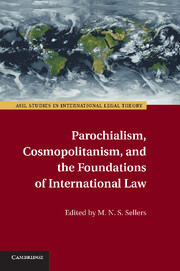Book contents
- Frontmatter
- Contents
- Notes on Contributors
- Preface
- 1 Introduction
- 2 Parochialism and the Legitimacy of International Law
- 3 Parochialism, Cosmopolitanism, and the Paradigms of International Law
- 4 Liberal Cosmopolitanism or Cosmopolitan Liberalism?
- 5 Are Human Rights Parochial?
- 6 The Parochial Foundations of Cosmopolitan Rights
- 7 Rights in Reverse
- 8 Parochial Restraints on Religious Liberty
- 9 Parochialism, Cosmopolitanism, and Justice
- Index
- References
1 - Introduction
Published online by Cambridge University Press: 05 December 2011
- Frontmatter
- Contents
- Notes on Contributors
- Preface
- 1 Introduction
- 2 Parochialism and the Legitimacy of International Law
- 3 Parochialism, Cosmopolitanism, and the Paradigms of International Law
- 4 Liberal Cosmopolitanism or Cosmopolitan Liberalism?
- 5 Are Human Rights Parochial?
- 6 The Parochial Foundations of Cosmopolitan Rights
- 7 Rights in Reverse
- 8 Parochial Restraints on Religious Liberty
- 9 Parochialism, Cosmopolitanism, and Justice
- Index
- References
Summary
People are parochial in their commitments and beliefs, and rightly so. We live, for the most part, among our neighbors, in our own home places, with local landscapes, customs, climates, and conventions. Much that is sweetest in life is built among human societies, according to the happenstance of provincial circumstances. This social nature of humanity pulls us together, but it also draws us apart, as we construct vastly different cultural superstructures on the foundations of our shared human nature. For most of history, humanity has lived in small and tightly knit bands of at most two hundred persons. We are profoundly adapted to find community, justice, and altruism within these narrow social units, while viewing outsiders with suspicion and self-righteousness. Peace, justice, and prosperity have advanced in the world as people have learned to expand their sense of sorority and fraternity to broader ranges of humanity, beyond their most immediate social affiliations.
When people view the whole world as one community, they become “cosmopolitans” or “citizens of the world” (as the word is usually translated), which might seem unreservedly desirable, were it not for the implication that citizenship is exclusive and that citizens of the world do not fully participate in the local societies to which they should belong. “Cosmopolitan” has often become a term of abuse in the hands of regional political leaders such as Joseph Stalin, who criticized “rootless cosmopolitans” as a threat to the integrity of the State. More recent critics of globalization have attacked “cosmopolitan” international law as a tool through which hegemonic powers exploit the weakness of less privileged regions and cultures. Viewing the whole world as one community may not seem so desirable when political control of that community falls into the hands of a universal despot, ruling without regard to local circumstances or justice.
- Type
- Chapter
- Information
- Publisher: Cambridge University PressPrint publication year: 2011



